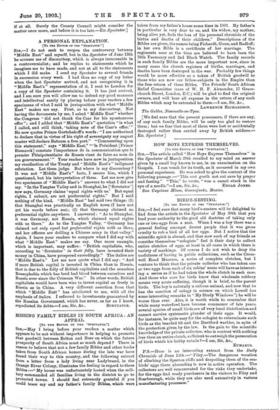BIRD'S-NESTING.
[To THE EDITOR OF THE "SPECTATOR:1 feel sure that many bird's-nesters will be delighted to find from the article in the Spectator of May 30th that you lend your authority to the good old doctrine of taking only one or two eggs from a nest. When I was a boy there was a general feeling amongst decent people that it was gross cruelty to rob a bird of all her eggs. But I notice that the scientific spirit is abroad, and that now such of my friends as consider themselves " oologists " feel it their duty to collect entire clutches of eggs, at least in all cases in which there is variety of markings. Of course I do not wish to deny the usefulness of having in public collections, such as the Crom- well Road Museum, a series of complete clutches, but I venture to think that the private collector who has taken one or two eggs from each of six robins' nests will havens interest- ing a series as if he had taken the whole clutch in each case. And those who care for birds know that wholesale robbery means very acute suffering, though it is brief, to the parent birds. The boy is naturally a callous animal, and now that lie has the sanction of oology (a science on which Lowell has some interesting remarks in "My Study Windows ") he will be worse than ever. Also, it is worth while to remember that while many waterfowl have become commoner of late years, several species of small birds are of very local distribution and cannot survive systematic plunder of their eggs. It would, for instance, be quite easy for the oologist to exterminate such birds as the bearded tit and the Dartford warbler, in spite of the protection given by the law. Is the gain to the scientific knowledge of the private collector, who is content with nothing less than an entire clutch, sufficient to outweigh the persecution of birds which his hobby entails ?—I am, Sir, Ste.,
EIIMAEUS.
P.S.—Here is an interesting extract from the Daily Chronicle of June 15th :—" Filey.—The dangerous vocation of climbing the Speeton cliffs and despoiling them of the sea- birds' eggs there abounding is now in active operation. The collectors are well remunerated for the risks they undertake, for the eggs find ready purchasers in the visitors to Filey and Scarborough, while they are also used extensively in various manufacturing processes."










































 Previous page
Previous page